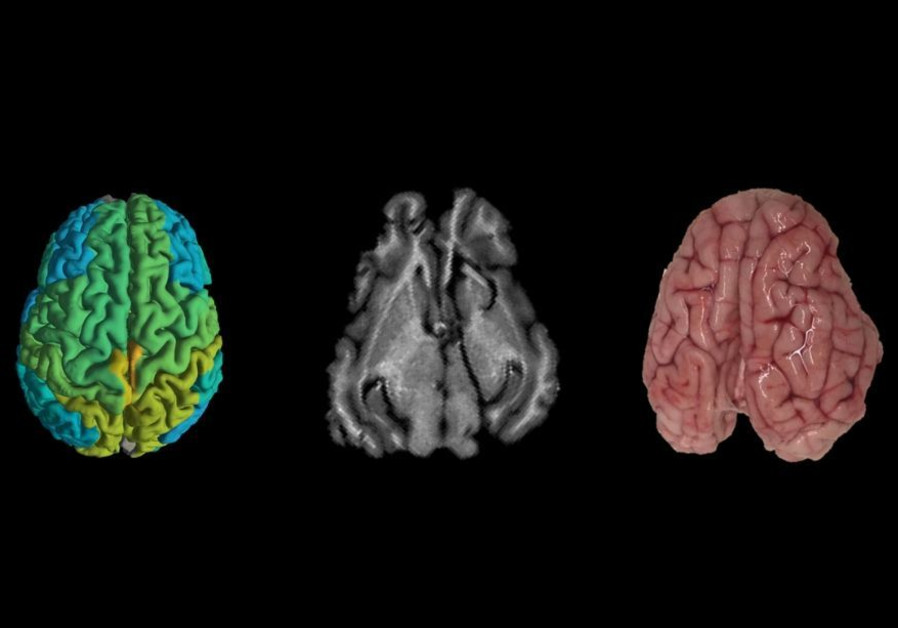Israeli imaging technique could help doctors predict Alzheimer’s, cancer

From Right to Left: Pig’s brain; standard MRI brain scan; new MRI scan showing differences in molecular makeup in different parts of the brain. (photo credit: SHIR FILO/HEBREW UNIVERSITY)
Doctors could soon be able to compare brain scans taken over time from the same patient and to differentiate between healthy and diseased brain tissue without conducting an invasive or dangerous procedure, thanks to new research by the Hebrew University of Jerusalem.
Dr. Aviv Mezer and his team at HUJI’s Edmond and Lily Safra Center for Brain Sciences successfully transformed an MRI (magnetic resonance imaging) from a diagnostic camera that takes pictures of our organs, bones and nerves into a device that can record changes in the biological makeup of brain tissue. This new MRI could help doctors more quickly determine the onset of disease and begin treatment.
Mezer said that MRIs have long been used as a way to analyze the brain.
“Because we know how to measure water in a very efficient and accurate way, we can now see the other aspect, how water interacts with the environment,” Mezer explained. “In that sense, we are measuring the molecules’ makeup.”
He said that this is a new level of information that was previously hidden to the medical community.
Mezer compared this new way of reading MRIs with taking a blood test.
“When we take a blood test, it shows us the exact number of white blood cells in our body and whether that number is higher than normal due to illness,” Mezer said.
This new analysis provides such information for the brain.
“We know that when we look at the brain post-mortem there is a huge difference in the macromolecules in different diseases – but now we can only see these changes post-mortem,” said Mezer. “The hope is that with our new approach, will be able to see those macromolecules in the brain and detect the onset of neurogenerative diseases while people are still alive.”
Specifically, Mezer believes that the new MRI technique will provide a crucial understanding into how our brains age: “When we scanned young and old patients’ brains, we saw that different brain areas ages differently. For example, in some white-matter areas, there is a decrease in brain tissue volume, whereas in the gray-matter, tissue volume remains constant. However, we saw major changes in the molecular makeup of the gray matter in younger versus older subjects.”

The results, he believes, is that patients will more likely receive correct diagnoses earlier, speeding up when they begin treatment, which potentially could help them maintain an improved quality of life longer, all via a non-invasive technique.
Join Jerusalem Post Premium Plus now for just $5 and upgrade your experience with an ads-free website and exclusive content. Click here>>






Comments are closed.